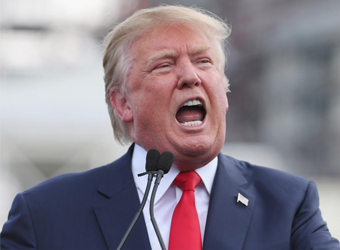President Donald Trump asserted in his extraordinary letter firing James Comey that the ousted FBI director told him three times he’s not under investigation, a questionable claim that if true would be a startling breach of protocol.
“Wouldn’t happen,” said one former federal prosecutor who led criminal cases against public officials.
Comey has publicly confirmed the FBI is investigating possible contacts between the Trump presidential campaign and Russia.
Trump offered no details about exactly what he was told or when. The White House declined to provide backup or explanation for Trump’s assertion in the letter.
In an argumentative interview Wednesday with CNN host Chris Cuomo, Trump adviser Kellyanne Conway said: “I’m not going to reveal to you conversations between the president of the United States and the director of the FBI.”
At the Capitol, Vice President Mike Pence repeated the assertion that Trump had been advised he isn’t under investigation, again with no detail.
Later, White House spokeswoman Sarah Huckabee Sanders said she did not think the exchanges between Trump and Comey were inappropriate.
In the letter, Trump wrote, “While I greatly appreciate you informing me, on three separate occasions, that I am not under investigation, I nevertheless concur with the judgment of the Department of Justice that you are not able to effectively lead the Bureau.”
Several former Justice Department officials and federal prosecutors doubted that Comey would have spoken in the terms used by Trump, or even offered any assurances at all.
FBI agents and Justice Department officials often identify people involved in an investigation as targets, subjects or witnesses. The first category applies to people who are likely to be criminally charged. Almost everyone else is a subject, probably not guilty of a crime but somehow involved. Witnesses might have seen or heard something, but aren’t otherwise implicated.
“Comey would not ever, in my opinion, say this to Trump,” Peter Zeidenberg, who prosecuted public officials on corruption charges for the Justice Department’s public integrity unit, wrote in an email.
“It is an ongoing investigation; there is no possible way that Comey could know that Trump was cleared of any misconduct at this stage of the investigation and it would be inappropriate for the FBI director, or any agent, to advise a potential subject of an investigation of their status directly. Wouldn’t happen,” Zeidenberg wrote.
Harvard Law School professor Laurence Tribe, who served in the Obama Justice Department, wrote, “That self-serving assertion was completely implausible. To put it bluntly, it appears to have been a blatant lie.”
Tribe said “it would have violated well-established DOJ rules and policies for the director to offer any such assurance to anyone, especially the president.
In addition, given Comey’s dependence on the president for retention of his role as head of the FBI, offering that assurance would be highly unethical and at odds with Comey’s reputation as a man of integrity.”
Zach Price, a professor at the University of California Hastings School of Law, said Trump’s firing of Comey is a blow against the independence of federal investigators and prosecutors. It’s acceptable for the president to ask who key suspects might be in an investigation that does not involve him or close associates, Price said, adding: “But it would be unusual for the president to push that for political reasons.”
Trump’s claim about what Comey supposedly told him seems to be a way of saying Trump himself is not implicated in the investigation of Russian campaign meddling, Price said.
James Koukios, a former fraud prosecutor in the Justice Department, said such a conversation would be unusual. “Defense attorneys always ask, ‘Is my client a target, subject or witness?’ There’s no obligation to answer, but I guess it’s possible they could have had the conversation. We’re in uncharted territory in a lot of ways,” he said.
Source: CNBC


